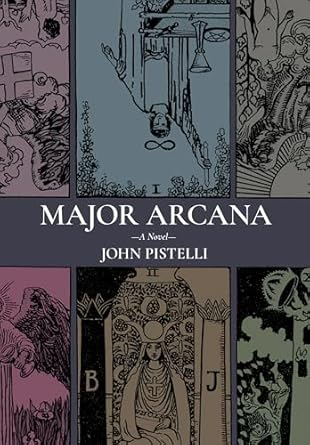Bad Vibes
A review of John Pistelli's novel Major Arcana, a comic book themed novel with a weird undertone about trans people.
Major Arcana - John Pistelli (Belt Publishing, 2025)
I don’t know John Pistelli. I don’t read his blog or his substack or have read any of his other books. I don’t know him but by the time I finished reading Major Arcana I had this feeling in the back of my mind: that he wouldn’t like me.
His new novel is sort of about comic books and sort of about love but it’s also more than a little bit about gender and the ways it has spiralled and changed since the pandemic. It follows an ex-comic book writer turned college professor named Simon Magnus, two of his students (Ash del Greco, an occultist who is world-weary by the time she’s old enough to drink, and a starry eyed young named Jacom Morrow), and three of Magus’s old colleagues: their lover and editor Ellen Chandler, an artist named Marco Cohen, and Cohen’s love Diane del Greco.

These people’s lives weave and intersect throughout some 20-odd years. Magnus and Cohen write a comic called Overman 3000 that’s something like Watchmen mixed with high science fiction. Chandler finds Magnus as a gender-confused young person in a cafe and eventually lands them a writing gig at VC Comics, where they follow a path familiar to Alan Moore fans. Both del Grecos hover at the margins as people who don’t fit in, and eventually the younger of them carries the back end of the book - a trip through the overly online through Tumblr, YouTube, and eventually to Morrow’s public suicide that kicks off the book.
Throughout the book, Pistelli controls things with a steady hand. While the broad strokes of Magnus’s career parallel Moore’s (Swamp Thing becomes Marsh Man; Batman: Killing Joke becomes Fools’ Errand) others seem drawn from writers like Grant Morrison. His narrative builds to a nicely plotted climax and something of a satisfying ending. It is a nice and tidy little package.
And yet, and yet. Throughout the book Pistelli keeps dropping little hints that I found harder and harder to ignore. Magnus changes pronouns throughout the book, eventually settling on using their own name as them: the always clunky Simin Mangusself. Ash del Greco does too, going deep into a non-binary identity before coming back and settling as a cishet woman. Many of the side characters do too: one goes from a cis woman to transmac to wanting to erase their gender entirely before becoming a born-again tradcath cis woman (her doctor kills himself rather than face punishment when this character’s mom threatens a lawsuit). Even blink-and-you’ll miss it characters have this vibe: the teens at del Greco’s “rainbow alliance” are shallow outlines of a trans woman crying she just wants to be a real woman, while the trans man is butch and threatening.
There is a streak of puritanism running throughout this book. The big cities - a New York stylized as Cosmopolis and a Los Angeles as Oceanopolis - are dens of confusion and chaos, where people are corrupted and turn against themselves. The small towns, the rural New England hamlet of Hollow Well and the college town this novel centres around, are where people find themselves, their real selves. They find religion, shed neopronouns, get married and have kids.
As Magnus puts it early in this book: ”These brevetted brats with their pronoun stickers, they - they/them! - were not the losers but winners of the social game, the game of power, a game for which Simon Magnus always at least tried to have, yes, contempt.”
Or as Chander puts it later: “She voted Republican now. Christ she thought, with the chaos the country was in - the crime, the prices, the wars, the gender theory in pre-school, and all the rest of it - how could you possibly not?” (emphasis mine).
Throughout the book, but especially as it roars towards a climax, these themes keep popping up. Magnus is ashamed of their earlier work, characters who pop in from small towns as if to blow away the collected leaves of postmodernism, come in and drop folksy wisdom like “What’s fine in a bar don’t make sense in a school or church…” I try not to read too hard into characters simply saying what the author thinks but when they keep piling up…
I’m not saying this makes Major Arcana a bad book. It’s one that’s well constructed and one that several people seem to enjoy. Pistelli’s ear for dialogue seems on point and he can write a sentence. But I’m inclined to agree with Cat Fitzpatrick of LittlePuss Press who called it a “cursed artifact of significant power.” It is one where if you aren’t paying close attention and questioning what’s happening a noxious sort of subtext will slip right by you. That’s if you still decide to read it, anyway.